Text
Brickclub 2.4.5 ‘A five franc piece falling on the floor makes a noise’
God, the equivocation and suspense in this chapter. It’s all a pile of flimsy surmises and awakened self-preservation instincts weighed against the desire to reassure oneself and the probability of having imagined it, and therein lies the creeping terror. As a character in a novel, Valjean looks maybe a little silly saying “it can’t possibly be Javert,” but that feels like such a real reaction to me. Instincts can misfire, and Valjean would much rather cling to this life he has with Cosette a little longer if he can.
Once again, it’s strangeness around money that people notice, and that’s what gives Valjean away–both in the alms-giving and the falling five-franc-piece.
Everything in the chapter is half-seen or half-heard. Even the narrator has fallen back on merely repeating the omnipresent gossip and surmise: jealous people said that beggar was in the pay of the police–but was he? Maybe the landlady meant something by what she said about living on his income–or maybe she didn’t. It’s true the tree on the boulevard could have concealed someone (what an ominous line!)–but did it?
I love the detail that Cosette’s recitations were loud. It’s such a normal little-kid detail, and also it’s the opposite of the mousey silence she had to maintain for so many years. But when Valjean needs to her to be silent and concealed, she obeys immediately and asks no questions. It’s sad and useful that they both have that skill.
Whatever Valjean’s reason tells him about vague surmise and the unlikelihood of Javert finding him here, his instincts tell him to run, and he listens.
25 notes
·
View notes
Photo
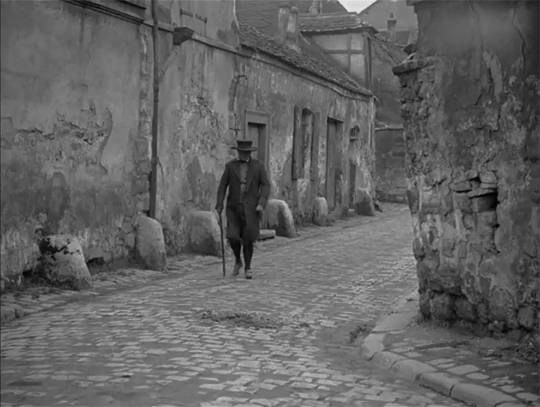
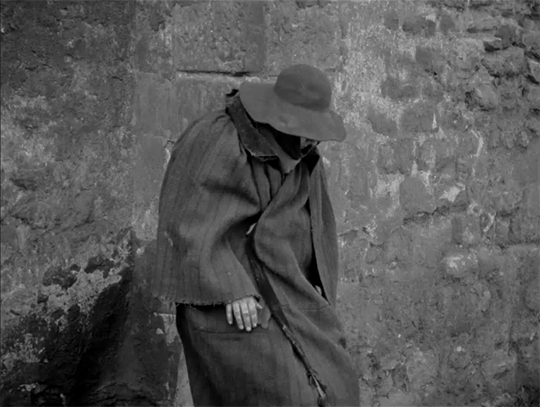

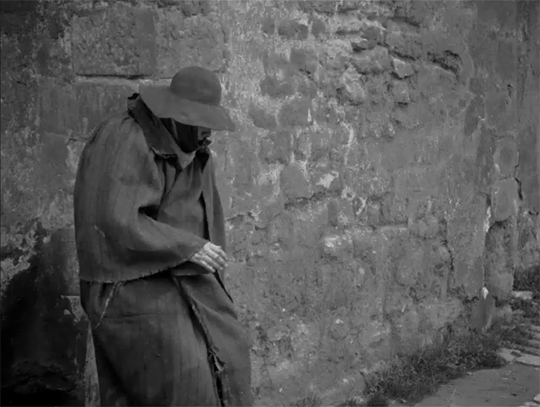

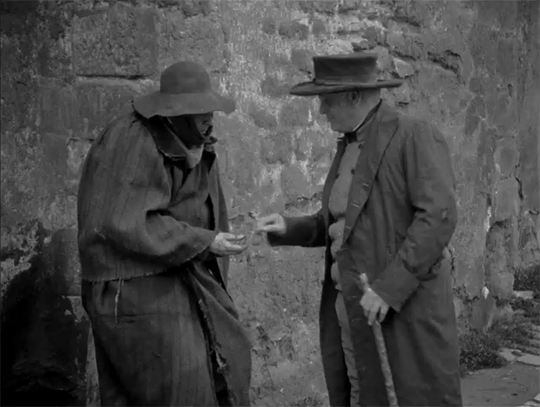
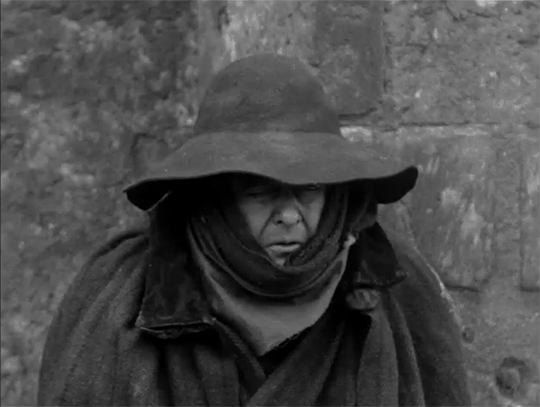


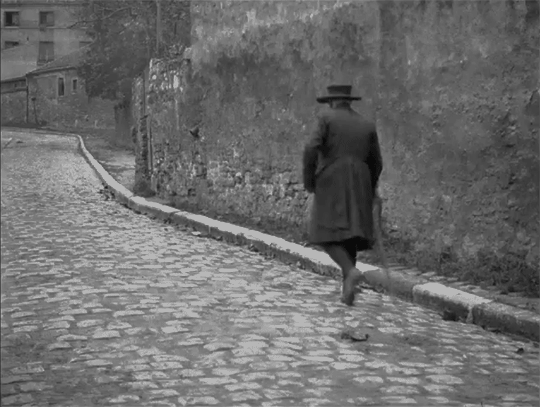
LES MIS LETTERS IN ADAPTATION - A Five-Franc Piece Falls on the Ground and Produces a Tumult, LM 2.4.5 (Les Miserables 1925)
Near Saint-Médard’s church there was a poor man who was in the habit of crouching on the brink of a public well which had been condemned, and on whom Jean Valjean was fond of bestowing charity. He never passed this man without giving him a few sous. Sometimes he spoke to him. Those who envied this mendicant said that he belonged to the police. He was an ex-beadle of seventy-five, who was constantly mumbling his prayers.
One evening, as Jean Valjean was passing by, when he had not Cosette with him, he saw the beggar in his usual place, beneath the lantern which had just been lighted. The man seemed engaged in prayer, according to his custom, and was much bent over. Jean Valjean stepped up to him and placed his customary alms in his hand. The mendicant raised his eyes suddenly, stared intently at Jean Valjean, then dropped his head quickly. This movement was like a flash of lightning. Jean Valjean was seized with a shudder. It seemed to him that he had just caught sight, by the light of the street lantern, not of the placid and beaming visage of the old beadle, but of a well-known and startling face. He experienced the same impression that one would have on finding one’s self, all of a sudden, face to face, in the dark, with a tiger. He recoiled, terrified, petrified, daring neither to breathe, to speak, to remain, nor to flee, staring at the beggar who had dropped his head, which was enveloped in a rag, and no longer appeared to know that he was there. At this strange moment, an instinct—possibly the mysterious instinct of self-preservation,—restrained Jean Valjean from uttering a word. The beggar had the same figure, the same rags, the same appearance as he had every day. “Bah!” said Jean Valjean, “I am mad! I am dreaming! Impossible!” And he returned profoundly troubled.
He hardly dared to confess, even to himself, that the face which he thought he had seen was the face of Javert.
57 notes
·
View notes
Text
but also, i find it interesting that the evidence of valjean’s disguises (the wigs) is mentioned just before we see javert disguised as the beggar. they continue to mirror each other, both knowing how to pass as someone else (but to different ends). it’s also a good storytelling technique, to introduce the concept of disguise in the chapter before someone (else) is actually disguising themselves.
50 notes
·
View notes
Text
The one, in which Veljean’s and Cosette’s idyll is shattered, and it is Javert who torments them. The moment of recognition is so vividly depicted that it sends shivers down my spine: “He experienced the same impression that one would have on finding one’s self, all of a sudden, face to face, in the dark, with a tiger. He recoiled, terrified, petrified, daring neither to breathe, to speak, to remain, nor to flee, staring at the beggar who had dropped his head, which was enveloped in a rag, and no longer appeared to know that he was there.” Despite this stark realization, Valjean deceives himself into believing it is impossible: “He hardly dared to confess, even to himself, that the face which he thought he had seen was the face of Javert.” It’s understandable why he clings to this denial — he doesn’t want his peaceful life with Cosette to be abruptly interrupted by this impossible intrusion.
And he continues to deceive himself, as he hears an unfamiliar presence in the Gorbeau house. Valjean’s reaction to this unwanted presence is to remain silent and invisible in the darkness. Cosette, obedient as ever, falls silent and heads to bed without question. This obedience reflects her past life, where compliance was likely a survival mechanism.
Javert’s presence and surveillance in the Grobeau house are marked by the light of the candle which “formed a sort of sinister star” through the keyhole. It’s such a powerful and terrifying image! As soon as we hear that in the morning Valjean sees the man “of lofty stature” through the keyhole, we can be sure that it is Javert. This pattern of a mysterious man turning out to be Valjean and a man “of lofty stature” turning out to be Javert is consistent throughout the narrative.
As Valjean’s worse suspicions are confirmed, he takes Cosette and leaves the Gorbeau house, not to return there in the next seven years or so.
24 notes
·
View notes
Text
Jean Valjean blowing out the candle is supposed to just be part of a larger moment of tension as he tries to figure out what’s going on, but after learning that there’s a specific way convicts blow out candles earlier in the book, I really just want to know how he blew it out.
66 notes
·
View notes
Text
She also noticed that there were all sorts of things in the pockets. Not only the needles, thread, and scissors which she had seen, but a big pocket-book, a very large knife, and—a suspicious circumstance—several wigs of various colors. Each pocket of this coat had the air of being in a manner provided against unexpected accidents.
me, with all sorts of toiletries, gadgets, and stationery in my backpack for only a 9 to 5 office job: he's just like me fr
27 notes
·
View notes
Text
Brickclub 2.4.4 ‘What the landlady discovered’
WIG WATCH: Valjean’s wigs have made their first and final appearance.
“It turned out that Cosette was very playful” is a line that gets it’s own paragraph, and there’s so much contained in that. We don’t get to see how sweet this was, but we know it was. And yet, there’s something so bitter and damning about that line. “It turned out”–as if this couldn’t have been “discovered” years earlier, had her circumstances been such that anyone got to know her and she ever had a chance to play
Valjean’s conspicuously ancient outfit and the mysterious yellow coat, his strange solitude, and the fact that no one can tell how much money he does or doesn’t have are coming back to bite him. This chapter is the beginning of the end for this idyll, because Valjean’s harmless eccentricity is dangerous.
Of his above mistakes, the one that actually matters is the money. Valjean doesn’t understand that everyone in society needs to know how much money everyone else possesses in order to judge them. In giving mixed signals about his wealth, he’s drawing the attention of every single person who reads the world the way the Thenardiers do.
Valjean feels here to me like an otherworldly creature pretending to be a man who doesn’t quite know the rules. The unnamed landlady spying through keyholes is the girl in all those stories who gets too curious about it and delves too deep–Cupid and Psyche, Bluebeard, etc. There’s always a price to that curiosity, but in the ones I’m recalling at least, it’s usually the girl who’s in danger.
Which is, in fact, how the landlady feels: Valjean’s being wealthy and concealing it feels threatening to people like her, because it seems suspicious, because who, given enough money, wouldn’t want to live like a rich person if they could? Myriel pulled that off, but only because when you scratched the surface of Myriel you found extreme social respectability all the way down. Eccentricity is acceptable if all you have to hide is aristocracy. Valjean, with his real and dangerous secrets, doesn’t have the luxury of being good the way Myriel was good.
And the landlady, frightened, perhaps subliminally fearing herself to be the protagonist of the Bluebeard story, gets at the paradox of policing: the police make socially secure people feel safe by causing terror and harm to socially insecure people.
39 notes
·
View notes
Text
Brickclub 2.4.4., “Remarks of the Principle Tenant”
Malicious gossip again, this time personified by the landlady at the Gorbeau House–several social classes below Mme. Victurnien, but doing the same work.
All of the judgement that Hugo does not level against lying in this book, he does level against the Victurniens of the world–the people who ferret out truths that they are not entitled to, and have no need for.
Though the way this predatory curiosity is leveled against Fantine and Valjean is very similar, the emotions driving it aren’t. Victurnien was having fun, and feeding her enjoyment with righteous anger. The landlady, though sees Valjean taking the banknote out of his coat “with alarm,” and flees “in great fright”–she reads his deception, his blurring of class boundaries, as a threat and she’s not entirely wrong to. As we’ll see in the next chapter, Valjean’s slipperiness around class and money, as ‘the beggar who gives alms,’ has already aroused suspicion in the neighborhood.
I feel like these chapters are setting up the Gorbeau ambush setpiece in more ways than just setting the scene. The Gorbeau House is where the ambiguously respectable go, but Valjean is too ambiguous, too deceptive, for even the Gorbeau House to hold him. His return there is going to set off a wave of violence–personal and criminal, and legal and institutional. Mme. Thenardier will die, and the little Thenardier boys will lose their foster-mother, as a direct result of the snare Valjean walks into.
The house is a snare–one of its more charming traits is the size of its spiders–and Valjean would never have been able to stay there without attracting that violence. The landlady isn’t afraid enough of what might be on his heels to go to the police by choice–but she will be afraid enough to cooperate with them once they arrive, as we’ll see in the next two chapters.
(Also looking ahead–Javert’s investigations and enforcement of boundaries are very much on a continuum with the landlady’s here, just as they are with Victurnien’s in M-s-M, and it is really striking me how weirdly gendered that is.)
17 notes
·
View notes
Text
but also, i find it interesting that the evidence of valjean’s disguises (the wigs) is mentioned just before we see javert disguised as the beggar. they continue to mirror each other, both knowing how to pass as someone else (but to different ends). it’s also a good storytelling technique, to introduce the concept of disguise in the chapter before someone (else) is actually disguising themselves.
50 notes
·
View notes
Text
We’ve reached Valjean’s wigs!
Although the old woman in the Gorbeau house is a gossip (which, after seeing the consequences of Madame Victurnien’s actions for Fantine, doesn’t bode well for Jean Valjean and Cosette), I do have to give her credit for one thing: helping to take care of Cosette.
“Every evening, at twilight, he walked for an hour or two, sometimes alone, often with Cosette, seeking the most deserted side alleys of the boulevard, and entering churches at nightfall. He liked to go to Saint-Médard, which is the nearest church. When he did not take Cosette with him, she remained with the old woman; but the child’s delight was to go out with the good man. She preferred an hour with him to all her rapturous tête-à-têtes with Catherine. He held her hand as they walked, and said sweet things to her.”
She also questioned Cosette, which, while related to her concerning love of gossip, demonstrates that she engages with her. Her care isn’t comparable to Valjean’s, but it highlights that (1), he’s not completely alone in raising her, regardless of what he thinks and (2), there’s a chance that Cosette will not only grow up loved, but less isolated than Valjean. His tendency towards isolation is completely understandable (due to both the legitimate fear of being caught and his trauma), but it’s also deeply unhealthy. Perhaps this early exposure to other people in a way that isn’t scary (as all the people visiting the inn in Montfermeil either ignored Cosette or thought her treatment was justified, her interactions with people outside of the Thénardiers have been negative with the exception of Valjean) will help her recover as well.
As usual, I love the care between Valjean and Cosette. She’s so happy to spend time with him, and the way he’s so attentive towards her (holding her hand, saying kind things) is adorable.
Valjean is also accidentally hilarious? The wigs are funny on their own, of course, but I also love how he tries to “stealthily” give out alms and is failing. It reminds me of his reverse robberies as mayor, where people generally knew that it was him, but he still couldn’t directly give assistance. Here, he is being more direct, but his position is more uncertain as well. As mayor, his habits were just eccentricities. Here, where he’s a “beggar” himself, his habits make him mysterious and, therefore, dangerous. We see this in the gossip over his thousand-franc bill, which, while understandable to an extent (it makes sense that it would shock the old woman if it’d only been her second or third time seeing one), centers around trying to determine his class to determine his place in the social order: how can a man so poorly dressed have so much money? Where does it come from? Why is he like this? Such questions are ominous ones for Valjean, who is firmly outside of the social order.
Unfortunately, Valjean’s strangeness is also sad. All of his bizarre behaviors (only going out at night, carrying wigs and other emergency materials, sneaking money to the poor) are mixed up with the demands of staying hidden (going out at night when he can’t be seen, for instance), his trauma from prison (isolation, increased paranoia at being sent back), his guilt (his almsgiving), or a combination of all of the above. Still, at least he now does these activities in the company of Cosette, who brings so much joy into his life.
Spoilers below:
Keep reading
36 notes
·
View notes
Photo
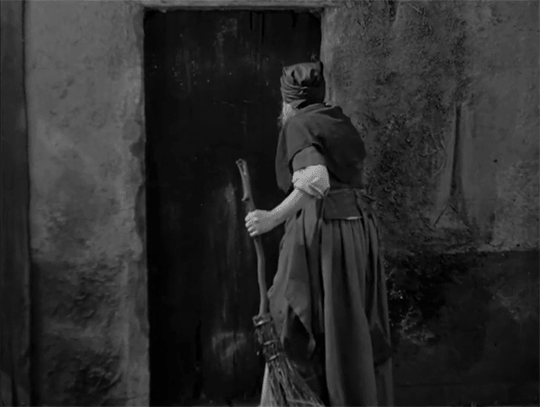
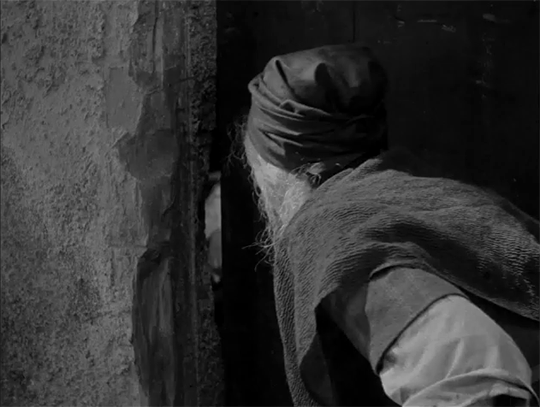

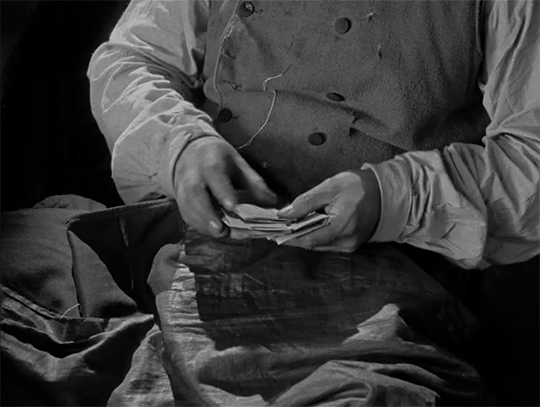
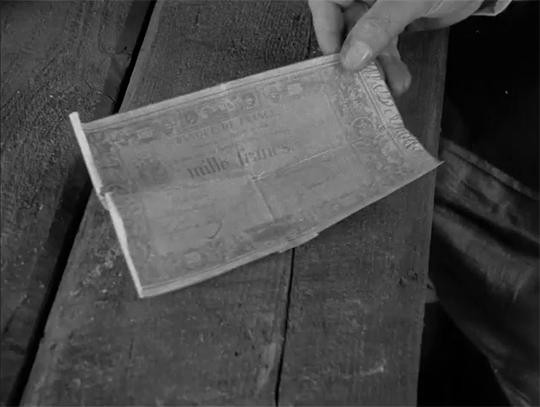
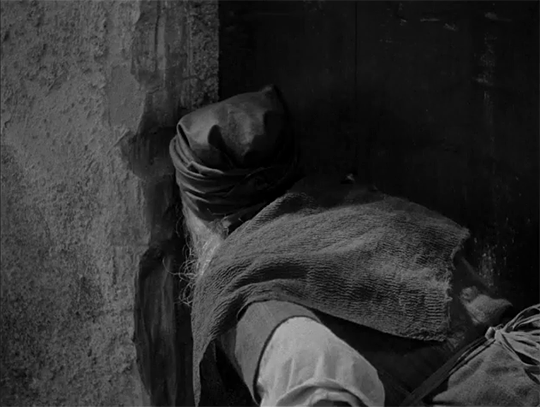


LES MIS LETTERS IN ADAPTATION - The Remarks of the Principal Tenant, LM 2.4.4 (Les Miserables 1925)
The old principal lodger, a cross-looking creature, who was thoroughly permeated, so far as her neighbors were concerned, with the inquisitiveness peculiar to envious persons, scrutinized Jean Valjean a great deal, without his suspecting the fact. She was a little deaf, which rendered her talkative. There remained to her from her past, two teeth,—one above, the other below,—which she was continually knocking against each other. She had questioned Cosette, who had not been able to tell her anything, since she knew nothing herself except that she had come from Montfermeil. One morning, this spy saw Jean Valjean, with an air which struck the old gossip as peculiar, entering one of the uninhabited compartments of the hovel. She followed him with the step of an old cat, and was able to observe him without being seen, through a crack in the door, which was directly opposite him. Jean Valjean had his back turned towards this door, by way of greater security, no doubt. The old woman saw him fumble in his pocket and draw thence a case, scissors, and thread; then he began to rip the lining of one of the skirts of his coat, and from the opening he took a bit of yellowish paper, which he unfolded. The old woman recognized, with terror, the fact that it was a bank-bill for a thousand francs. It was the second or third only that she had seen in the course of her existence. She fled in alarm.
38 notes
·
View notes
Text
Happy Wig Pocket day to everyone following @lesmisletters!
She also noticed that there were all sorts of things in the pockets [of Valjean’s coat.] Not only the needles, thread, and scissors which she had seen, but a big pocket-book, a very large knife, and—a suspicious circumstance—several wigs of various colors. Each pocket of this coat had the air of being in a manner provided against unexpected accidents.
59 notes
·
View notes
Text
favorite thing about the Les Mis Letters server this year has been the growing certainty that the TRUE villain of Les Mis is Geometry
46 notes
·
View notes
Text
I’m thinking again about how Valjean didn’t just save Cosette— she also saved him, and the two of them saved each other.
He loved and grew strong again. Alas! he walked with no less indecision than Cosette. He protected her, and she strengthened him. Thanks to him, she could walk through life; thanks to her, he could continue in virtue. He was that child’s stay, and she was his prop.
I mentioned before how both of them are terrified of the Thenardier’s for similar reasons— Cosette because they can abuse her, Valjean because they keep coming close to suspecting he’s a criminal on the run; Cosette because Madame Thenardier might whip her, and Valjean because he knows they can send him back to prison where he’ll be under the lash again.
And I’ve also written about how they both enter a similar state of terror when they’re alone in the wilderness, like they both have a deep subconscious fear of their own isolation—- Valjean is terrified at the empty black landscape when he leaves Digne, Cosette is terrified of the empty black landscape the moment she leaves Montfermeil for the woods.
And then, as I wrote about here, they both have similar “panic attacks” from the lingering effects of trauma on them even after they’ve been “freed.”
Neither of them have ever had the opportunity to love anyone before, and so both of their lives are changed entirely when they come together to love each other, help each other and give each other reasons to live.
108 notes
·
View notes
Text
Jean Valjean and Cosette are learning to love!
It’s fascinating how Hugo creates parallels between them in how little they remember of their early lives, making this love seem new to them even if they’d been loved and loved before. With Valjean specifically, we get this:
“Jean Valjean had never loved anything; for twenty-five years he had been alone in the world. He had never been father, lover, husband, friend. In the prison he had been vicious, gloomy, chaste, ignorant, and shy. The heart of that ex-convict was full of virginity. His sister and his sister’s children had left him only a vague and far-off memory which had finally almost completely vanished; he had made every effort to find them, and not having been able to find them, he had forgotten them. Human nature is made thus; the other tender emotions of his youth, if he had ever had any, had fallen into an abyss.”
The paragraph almost contradicts itself, beginning with the bold assertion that he had “never loved” and repeating it with all the roles he had “never” occupied before discussing his family that, while he may not remember them well, we know he loved because he went to prison for that love. In a way, this feels more like how Jean Valjean would perceive himself than how Hugo would describe him. Hugo (and we as readers) knows what his early life was like. It wasn’t great, but he did love; he wouldn’t have wept and reached for the children when he was imprisoned if it weren’t for that love. Valjean, however, is only aware of all of this on a theoretical level. Having suppressed memories of his family due to trauma, he doesn’t remember that love, leading to sentences like the last one, where we’re made to question if “he had ever had” love in his life. The reality of that past love doesn’t match his lived experience. To him, it’s as if he’d never felt it because he doesn’t remember it, hence the boldness at the beginning of the paragraph. Hugo also stresses this break between his obscured past and his present by calling Valjean’s heart “new,” as if the old one had been lost or destroyed while he was in the bagne.
Now that he does have a chance to love, Valjean doesn’t limit himself to the “roles” expected of him. He “had never been a father,” but he is one now, fulfilling one of those roles. However, he also feels like a mother would, underscoring how he occupies both roles simultaneously in Cosette’s life at the moment and how, in this space that’s seemingly outside of society, their emotions can take precedence over typical social roles. Ultimately, the joy they both get out of his feelings as a mother-father is more important than societal norms around love in the shelter of the Gorbeau house.
Cosette continues to be similar to Valjean with a key distinction: she’s not as worn down yet. Like with him, her suffering made her heart “cold.” In contrast, though, Hugo stresses that she lacked the “possibility” of love, whereas Valjean seems to be regaining the ability as well as the possibility (especially since Hugo confirms he was at risk of slipping back into hatred of the world, as he felt before the bishop). He definitely rescued her from a worse fate (just as she’s rescuing him), but she’s also benefitting from what Hugo sees as the resilience of childhood. She even specifically sings “from daybreak” now, a radical break from the rest of her years.
43 notes
·
View notes
Text
Cosette was no longer in rags; she was in mourning. She had emerged from misery, and she was entering into life.
LM II.IV.III
i was never my father's daughter.
that's a consequence, you see, of my coming out after he died: he was otherwise occupied being ashes on a mountainside, and therefore was not exactly around to witness my entrance into a fuller life.
our relationship was difficult––for many reasons, few of which are relevant to this reflection or the chapter at hand––and so, necessarily, my mourning of him included mourning the things we were not up to the challenge of processing while he was alive. that he missed out on the privilege of knowing me as his daughter is irretrievably among them.
so there i found myself, restored to my place as a daughter, who seemed to have mysteriously misplaced a parent to be a daughter to. that strange conundrum of being a daughter without the parent is precisely, and to my great surprise, where cosette finds herself in the garret.
cosette, who has suffered and died in a manmade hell, is reborn, “becoming another being,” coming into herself as a daughter instead of a servant, taking off the rags of unlovedness and putting on the mantle of daughterhood. because she certainly is a daughter…
only, fantine is dead.
cosette is forced to negotiate becoming a daughter who has no mother to be a daughter to. in other words, to twist ts eliot: she has the meaning, but misses the experience––and is altogether too young to find her way through it alone.
enter valjean, who provides the experience.
as if driven by instinct, he who has never raised a child buys cosette mourning clothes. he tells her stories of her mother, has her pray. and through these rituals he devises, he makes a place for cosette in this new and full life. he anoints her as a daughter in much the same way fantine anointed him to be a mother, whose labors in the intervening months entailed his own symbolic death.
after all, who else can so fittingly be a parent to a reborn daughter, than one who has himself seen death?
an odd pair they make, the daughter with no mother and the loveless, childless man who must become both parents; "oh, unfathomable and divine mystery of the balances of destiny!" together they mourn, and together they enter new life.
12 notes
·
View notes
Text
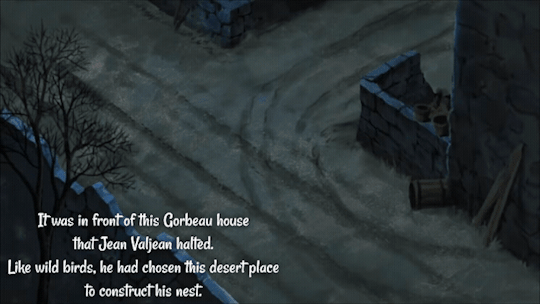



The Owl and Wren settle in their New Nest. Volume 2, Book 4, Chapter 2.
Clips from <Il cuore di Cosette>.
17 notes
·
View notes